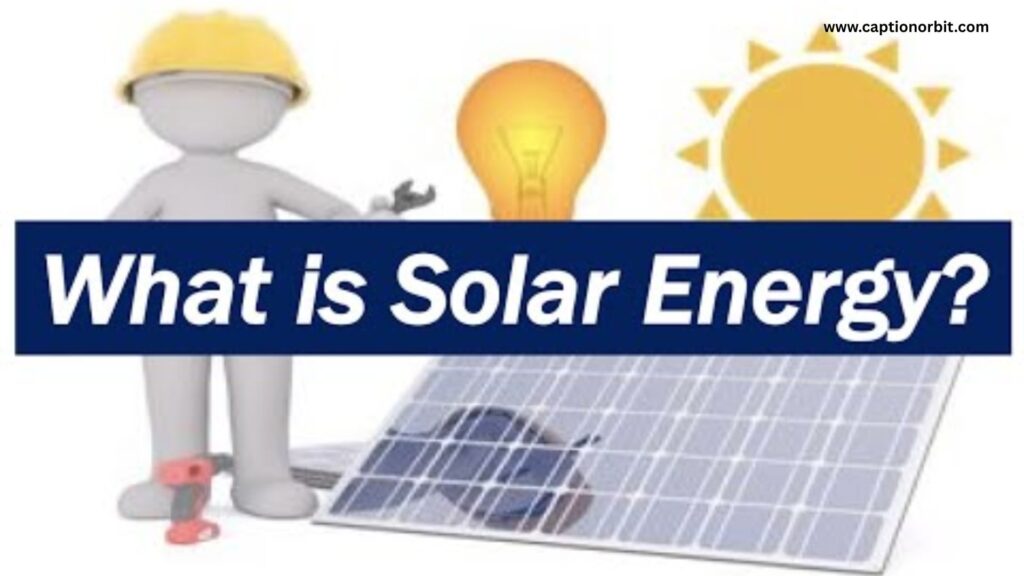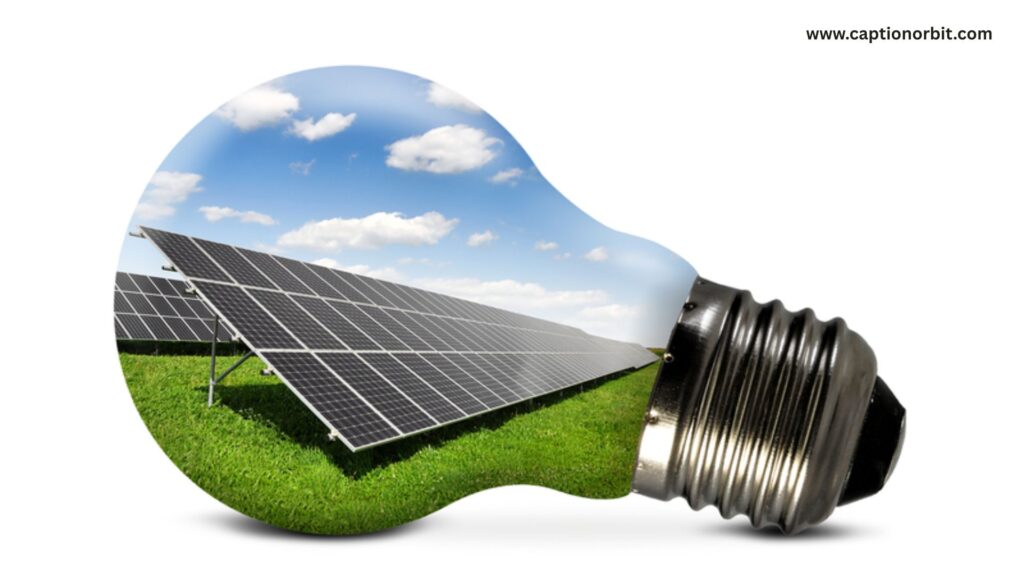As the world continues to face pressing environmental issues, Solar Energy Captions has emerged as a crucial solution. It not only helps mitigate climate change but also offers a sustainable, cost effective way to generate power. Solar energy, derived from the sun’s natural rays, is abundant, renewable, and clean. It’s no surprise that this form of energy is gaining popularity globally, from individuals to businesses and governments.
Platforms like Instagram are perfect for spreading the word about the benefits of solar energy. Through captivating solar energy captions, individuals and organizations can inspire others to adopt solar power and contribute to a more sustainable future. In this post, we’ll explore creative and informative solar energy captions that will boost your Instagram presence and help raise awareness about the importance of switching to renewable energy.
Why Solar Energy is Essential

Solar power is one of the most effective renewable Solar Energy Captions solutions. It helps combat the depletion of fossil fuels, reduces greenhouse gas emissions, and cuts down on air pollution. Solar energy is not just an alternative to traditional power sources but a vital part of the global transition to cleaner, more sustainable living.
By tapping into the sun’s energy, we can reduce our dependency on non-renewable resources. The widespread adoption of solar power not only reduces our carbon footprint but also promotes energy independence. This means that fewer people will rely on centralized power grids, leading to greater energy security and more affordable energy.
Creative Solar Energy Captions for Instagram
A compelling solar energy caption can go a long way in educating and inspiring others to embrace clean energy. Here are some thought provoking caption ideas to highlight the benefits of solar energy on your Instagram posts:
Let the sun power your world. SolarEnergy CleanPower”
“Every solar panel installed is a victory for the planet. SustainableLiving”
“Solar power good for the planet, great for your wallet! GoSolar”
“Shining bright with solar energy. SolarPowerSolutions”
“Together, we can create a solar powered future. SolarEnergy”
Empowering Solar Energy Quotes for Instagram

Sometimes, a powerful quote can convey a message more effectively than words alone. Motivational solar energy quotes can spark interest, educate followers, and inspire them to consider solar power. Here are some impactful quotes you can use to elevate your posts:
“Solar energy is not just the future; it’s the present. RenewableEnergy”
“Every solar panel is a small victory for our planet. SolarRevolution”
“Let the sun light your way to a greener tomorrow. Solar Energy Captions
“Switch to solar power it’s an investment in both the planet and your finances. GreenEnergy”
“Solar energy has the power to change the world. Be part of that change. CleanEnergy”
Fun and Witty Solar Energy Captions
Sometimes humor is the best way to catch attention and engage your followers. If you want to lighten up the conversation around solar power, funny solar energy captions or solar puns can do the trick. Here are some amusing caption ideas that add a touch of humor while still promoting clean energy:
“Solar power is my kind of current. SolarPuns”
“Feeling recharged with solar energy today! SolarPower”
“Shining brighter than my energy bill. SolarHumor”
“Solar energy always a bright idea EcoFriendlyLiving”
“My solar panels are the real stars. SolarEnergy”
Raising Awareness About Solar Power
One of the most powerful uses of social media is raising awareness about important causes. Through solar energy awareness captions, you can educate your followers and help them understand why transitioning to solar power is a crucial step in securing a better future for our planet. Here are some impactful captions to raise awareness:
“Solar power isn’t just a trend it’s the future. SolarAwareness”
“Join the solar movement, and be part of the solution. RenewableEnergy”
“Going solar is more than just an investment; it’s a step toward saving the planet. SustainableFuture”
“Every solar panel installed makes a positive impact. Let’s go solar together. SolarEnergy”
“Clean energy is the way forward. Let’s power the world with the sun. SolarPower”
Documenting Your Solar Journey

Personal experiences can inspire and motivate others to make the change to solar energy. Sharing your own solar journey whether you’ve already installed solar panels or are in the process can help followers visualize the transformation. Here are some captions to share your journey and inspire others:
“Just installed solar panels! Feeling good about reducing my carbon footprint. SolarJourney”
“My home is now powered by the sun. SustainableLiving”
“Switching to solar is the best decision I’ve made for my home and the planet. SolarPower”
“From high energy bills to solar savings. SolarLiving”
“Proud to be part of the solar revolution. SolarEnergy”
Solar Energy Puns to Lighten the Mood
If you want to keep your content light and engaging, solar power puns are an excellent way to bring a smile to your followers’ faces. Puns also make your posts more memorable while still highlighting the importance of solar energy. Here are some clever solar energy puns to use:
“Solar power shocking savings! SolarPuns”
“Powered by the sun, fueled by savings. SolarEnergy”
“I’m positively charged about my solar panels. SolarPower”
“My energy bills are looking a lot brighter. SolarEnergy”
“Sun’s out, solar panels on. SolarPower”
Essential Solar Energy Hashtags

In order to increase the visibility of your posts, using the right solar energy hashtags is key. These hashtags will help you reach people who are passionate about renewable energy and encourage others to explore the benefits of solar power. Some popular solar energy hashtags include:
SolarEnergy
CleanEnergy
GoSolar
RenewableEnergy
SustainableLiving
SolarPower
SolarPanels
GreenEnergy
SolarRevolution
EcoFriendly
The Positive Impact of Solar Energy
Solar energy has emerged as one of the most powerful tools in the global push toward sustainability. As a clean, renewable energy source, it offers far-reaching benefits not only for the environment but also for the economy, society, and individual well-being. Transitioning to solar power is a key strategy in tackling climate change and reducing reliance on finite fossil fuels. In this section, we’ll explore in detail how solar energy is making a significant positive impact on our world.
Environmental Advantages of Solar Energy
The environmental benefits of solar power are vast and undeniable. Unlike conventional energy sources, solar energy generates electricity without harmful emissions or waste. Here’s a closer look at how solar energy is helping the environment:
Minimizing Greenhouse Gas Emissions
The burning of fossil fuels for electricity generation releases greenhouse gases like carbon dioxide CO2 and methane, which contribute to global warming. Solar energy, on the other hand, produces no emissions during energy generation. This helps to significantly reduce the levels of CO2 in the atmosphere and curb the acceleration of climate change.
By replacing fossil fuel-based power generation with solar energy, we can achieve substantial reductions in carbon footprints. According to a study by the National Renewable Energy Laboratory NREL, solar power could cut CO2 emissions by over 20 billion tons in the coming decades, slowing the harmful effects of climate change and protecting the environment for future generations.
Reducing Pollution and Preserving Water
Traditional energy production methods not only release greenhouse gases but also contribute to air and water pollution. Fossil fuel power plants emit toxic gases that degrade air quality, and the extraction and burning of these fuels can result in contaminated water resources.
Solar energy does not produce these byproducts. It operates without emitting pollutants into the air and without consuming water for cooling, unlike conventional power plants that use vast amounts of water to produce electricity. Solar power is water-efficient and preserves clean water resources, which is vital in areas facing water scarcity.
Conservation of Natural Resources
Solar energy relies on an abundant and renewable resource: the sun. Unlike fossil fuels, which are finite and are becoming increasingly difficult to extract, solar energy offers a virtually unlimited source of power. By harnessing the sun’s energy, we reduce our dependence on nonrenewable resources and move toward a more sustainable future.Furthermore, the production of solar panels requires far less environmental disruption compared to mining or drilling for fossil fuels. This makes solar power a more sustainable energy source in the long term, ensuring that we don’t deplete the Earth’s natural resources.
Economic Benefits of Solar Energy
The economic impact of solar energy is equally compelling. It offers financial savings for individuals, job creation in the clean energy sector, and broader economic benefits for businesses and governments. Here’s a deeper look at these economic advantages:
Significant Savings on Energy Bills
One of the most immediate financial benefits of switching to solar energy is the reduction in electricity costs. Solar power allows homeowners and businesses to generate their own electricity, leading to lower utility bills. In many regions, users can even sell surplus energy back to the grid through programs like net metering, which further helps reduce overall energy expenses.
By installing solar panels, property owners are essentially locking in lower energy costs for decades, especially since solar panel prices have dropped significantly in recent years. Over time, the initial investment in solar technology can pay off with substantial savings on energy bills.
Job Creation and Economic Growth
The solar industry has become a major job creator globally. From manufacturing and installation to maintenance and research, the demand for solar power has created millions of jobs. According to a 2021 report by the International Renewable Energy Agency (IRENA), solar energy accounted for the majority of renewable energy jobs worldwide, with over 3 million people employed in the sector.
As the industry continues to grow, so do the opportunities for skilled workers in various fields. This job creation not only helps individuals find stable employment but also stimulates local economies by attracting investment and fostering the development of new technologies.
Driving Innovation and Investments
The solar industry has spurred massive innovation in energy technology. Investment in solar power continues to rise, with governments and private companies pouring money into research and development. This has led to improvements in solar panel efficiency, battery storage technology, and grid integration. The continuous innovation within the sector promises even greater cost reductions and more effective solutions for harnessing solar energy.
Moreover, by prioritizing clean energy solutions like solar power, countries can enhance their energy security and reduce reliance on foreign fossil fuels. This strengthens local economies and makes energy systems more resilient to external shocks.
Social and Societal Benefits of Solar Energy
In addition to its environmental and economic benefits, solar energy offers a range of social and societal advantages, improving the quality of life for communities worldwide. Here’s a closer look at how solar energy contributes to societal well-being:
Expanding Energy Access in Remote Regions
In remote areas, access to reliable electricity is often limited. Solar power offers an effective and cost-efficient solution to this challenge. By installing off-grid solar systems, rural communities can gain access to electricity without the need for expensive infrastructure or centralized power plants.
This improved energy access can enhance the lives of people in developing regions, powering schools, healthcare centers, businesses, and homes. It can improve education, create economic opportunities, and help reduce poverty.
Promoting Energy Independence
Solar energy enables energy independence, both at the national and individual levels. By investing in solar power, countries can reduce their reliance on imported fossil fuels, which can be subject to price volatility and geopolitical tensions. At the individual level, homeowners who adopt solar energy can reduce their dependence on utility companies and gain more control over their energy consumption.
As more people and businesses transition to solar power, the collective demand for fossil fuels will decrease, which can help stabilize energy prices and protect national economies from fuel supply disruptions.
Empowering Communities and Promoting Sustainability
Solar energy plays a critical role in promoting sustainable living and fostering a culture of environmental stewardship. Communities that embrace solar power not only reduce their carbon footprint but also set an example for others to follow. As more people adopt solar energy, it creates a ripple effect, encouraging others to consider renewable energy solutions.
Moreover, solar energy projects can bring economic benefits to local communities, from creating jobs to generating tax revenue. Community solar programs, for instance, allow groups of individuals or businesses to share the benefits of a larger solar installation, further strengthening local economies.
Solar Energy and the Fight Against Climate Change
Climate change is one of the most urgent challenges facing the world today, and solar energy is one of the most effective tools we have in the fight to mitigate its effects. By reducing our reliance on fossil fuels and decreasing carbon emissions, solar power helps us slow global warming and protect the planet.
Global initiatives like the Paris Agreement aim to limit global temperature rise and curb greenhouse gas emissions.Solar Energy Captions plays a central role in achieving these climate goals, as it provides a clean, renewable alternative to carbon-intensive fossil fuels. If adopted on a global scale, solar energy has the potential to significantly reduce carbon emissions and help combat climate change.
FAQs: Solar Energy Captions

What is solar energy?
Solar energy is energy derived from the sun. It can be captured using solar panels, which absorb sunlight and convert it into electricity. Solar power is a renewable energy source, meaning it can be continually harnessed as long as the sun shines. This energy can be used for a variety of applications, including generating electricity and providing heat.
How does solar energy work?
Solar energy works through the use of photovoltaic PV panels. These panels are made up of cells that capture sunlight and convert it into direct current DC electricity. An inverter is then used to convert this DC electricity into alternating current AC, which is the type of electricity most commonly used in homes and businesses. The more sunlight the panels receive, the more electricity they can produce.
What are the benefits of solar energy?
Solar energy offers several key benefits. First, it is an environmentally friendly option as it significantly reduces the carbon footprint. By replacing fossil fuels with solar power, solar energy helps combat climate change by lowering greenhouse gas emissions. Additionally, solar energy can reduce electricity costs, providing long-term savings by cutting utility bills. Another benefit is energy independence, as solar power helps reduce reliance on imported fuels. The solar energy sector also contributes to job creation, from installation to maintenance of solar systems. Lastly, solar energy is a sustainable solution, as it can be continually harnessed without depleting natural resources.
Is solar energy a renewable resource?
Yes, solar energy is a renewable resource. The sun provides an inexhaustible supply of energy that we can harness without depleting its resources. Unlike fossil fuels, which are finite, solar energy will be available as long as the sun exists, making it a sustainable and long-term solution for meeting global energy needs.
Can solar energy be used on cloudy days or at night?
While solar panels generate the most electricity when exposed to direct sunlight, they can still produce power on cloudy days, although at a reduced efficiency. Solar energy systems can also store energy in batteries to be used at night or during periods of overcast weather. This helps to maintain a steady power supply even when the sun isn’t shining.
What is the cost of installing solar panels?
The cost of installing solar panels can vary depending on the size of the system and the location of the installation. On average, the upfront cost for a residential solar panel system ranges between $10,000 and $30,000. However, many countries offer tax incentives and subsidies, which can significantly reduce this cost. Over time, savings on electricity bills and possible income from excess energy production can help recoup the initial investment.
How long do solar panels last?
Solar panels are designed to last for 25 to 30 years. Over this time, the efficiency of the panels may decrease slightly, but they will continue to generate power for many years. Most solar panels come with warranties that cover performance for 20 to 25 years, ensuring they will continue to function optimally during their lifespan.
What is net metering?
Net metering is a system that allows solar panel owners to send excess electricity back to the grid. When your solar panels generate more electricity than you need, the excess power is transferred to the grid, and you receive credits on your electricity bill. These credits can offset the cost of power you draw from the grid when your system is not producing enough energy, such as during the night.
What are solar energy incentives and tax credits?
Governments around the world offer various incentives to encourage the adoption of solar energy. For example, in the U.S., the Investment Tax Credit (ITC) offers a 26% tax credit for the installation of solar systems, which reduces the upfront cost for homeowners. Many other countries provide similar programs, including rebates, grants, and tax deductions, making solar energy more affordable and accessible.
Are there any disadvantages of solar energy?
While solar energy offers numerous advantages, it does have some drawbacks. One disadvantage is the high initial cost of purchasing and installing solar panels, though this can be offset over time with tax incentives and savings on energy bills. Solar energy systems also depend on weather conditions, as cloudy days or nighttime hours produce less electricity. Finally, large solar installations require ample space, which may not always be available in urban areas.
Can solar power be used for businesses?
Solar power is increasingly being used by businesses to reduce energy costs and improve sustainability. Solar installations can lower utility bills, improve a company’s environmental credentials, and provide long-term savings. Many businesses also benefit from solar energy incentives, which further reduce the cost of installation. Whether it’s a small store or a large industrial facility, solar energy can be a valuable solution for businesses looking to reduce their carbon footprint and operating costs.
Is solar power cost-effective?
Yes, solar power can be very cost-effective in the long run. While the initial investment in solar panels can be high, the savings on electricity bills typically result in a return on investment within 6 to 10 years. After that, the energy produced by your solar panels is essentially free. Additionally, the price of solar panels has been steadily decreasing, and government incentives make it an even more cost-effective option for many homeowners and businesses.
How can solar energy help combat climate change?
Solar energy plays a crucial role in mitigating climate change by reducing the reliance on fossil fuels. Traditional fossil fuels release carbon dioxide CO2 and other greenhouse gases into the atmosphere, contributing to global warming. By replacing these fuels with clean solar energy, we can significantly reduce emissions and help slow down the effects of climate change. Solar energy is a key component of the global transition to a low carbon economy.
Can solar energy be used for heating?
Yes, solar energy can be used for heating. Solar thermal systems are designed to capture heat from the sun and use it to heat water or air. These systems can be used for space heating in homes or businesses or to provide hot water. Solar heating systems are energy efficient and can significantly reduce heating costs, especially in sunny climates.
What are the environmental impacts of solar panel production?
The production of solar panels does have some environmental impact. Manufacturing solar panels requires materials such as silicon, aluminum, and glass, and the production process consumes energy. However, these impacts are much lower compared to the environmental harm caused by fossil fuel extraction and energy generation. Additionally, solar panels have a long lifespan, and as solar technology improves, efforts to recycle old panels are becoming more efficient, further reducing the environmental impact.
How can I maintain my solar panels?
Maintaining solar panels is relatively simple. Regular cleaning to remove dirt, dust, and debris from the panels is essential to ensure maximum efficiency. Additionally, it’s important to check for any shading from trees or nearby structures that could reduce the amount of sunlight the panels receive. It is also recommended to have a professional perform routine inspections to ensure the system is operating at optimal levels.
What is the future of solar energy?
The future of solar energy looks bright. As technology advances, solar panels are becoming more efficient, affordable, and durable. Battery storage technologies are improving, making it easier to store excess energy for use during low-production periods. Smart grids are also helping to optimize energy distribution and manage the variability of solar power. As governments and businesses continue to invest in solar infrastructure, the global adoption of solar energy is expected to grow significantly, contributing to a sustainable and green energy future.
Is solar energy available worldwide?
Yes, solar energy is available almost everywhere in the world, though the amount of sunlight varies depending on the region. Countries closer to the equator receive more direct sunlight and are ideal locations for solar installations. However, solar power can still be effective in countries with cooler climates, although the panels may produce slightly less energy. The widespread availability of solar energy makes it an accessible and scalable solution for global energy needs.
Conclusion
The positive impact of solar energy cannot be overstated. As a clean, renewable energy source, it offers a wide range of environmental, economic, and societal benefits. By reducing greenhouse gas emissions, conserving natural resources, saving money, and creating jobs, solar power is driving the global transition to a more sustainable future. It empowers communities, enhances energy security, and plays a pivotal role in tackling climate change.
Adopting solar energy is not just a smart choice it’s a necessary one. Whether you’re an individual looking to reduce your electricity bills, a business owner aiming to cut operating costs, or a policymaker focused on building a sustainable economy, solar energy provides an effective solution for a better future. The time to embrace solar power is now, and its potential to positively impact the world is boundless.ers, and inspire change. Whether you’re sharing motivational quotes, humorous puns, or documenting your solar journey, every post has the potential to drive positive action. Let’s embrace solar power and work together to create a more sustainable world for future generations.

Aira Younk is the creative force behind CaptionOrbit, where she brings a fresh spin to your daily routine with engaging and relatable captions. Whether it’s adding a touch of humor or a burst of inspiration, Aira crafts the perfect words to help you share your everyday moments in a creative way. Stay tuned for daily updates that will make your posts stand out!

